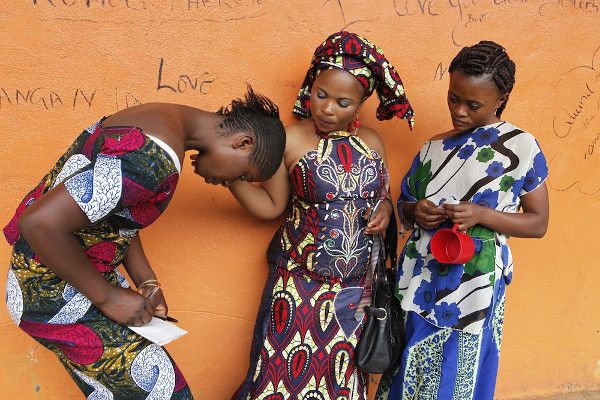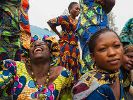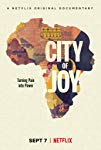Eye For Film >> Movies >> City Of Joy (2016) Film Review
City Of Joy
Reviewed by: Jennie Kermode

Ever since Leopold II of Belgium began exploiting the rubber trade in 1884, the Congo (and its neighbour, Rwanda) has been a testing ground for atrocities. Western hunger for tree sap has now been exploited by a hunger for coltan, gold and uranium, but the result is much the same. It's in rich nations' interest to promote chaos, to keep local people from taking ownership of their resources. Where they can't be exploited for labour, the Congolese people are just in the way. The recent conflicts have seen around 48 women and girls raped every hour. Yet in a small gated community near the eastern city of Bukavu, a project is taking shape that aims to bring that to an end.
Originally developed by Christine Schuler Deschryver, a local woman with the advantage of a privileged background, and by Denis Mukwege, a doctor who experienced his own crisis after realising that the ruined bodies on which he was operating were the result of deliberate military strategy, the project has since benefited from the support of author Eve Ensler. When she was originally introduced as a celebrity, Christine was wary, she recalls, having seen a lot of famous people come a go just to get their photos taken visiting victims, but Eve's ongoing involvement hasn't been about her celebrity, rather her skills as an activist. The City of Joy can't take in and shelter every woman forever. What it can do is help survivors to recover their confidence, teach them to value their bodies (often for the first time), make them believe that they have the right to live and take up space in the world. It can teach them simple combat techniques, give them skills that will make them employable, and send them back to their communities as leaders, free from fear and ready to take control.

It's an ambitious project, and perhaps, in the long term, the only thing that can make a difference, but of course there are no guarantees. About halfway through, a woman asks what they should do if attacked by men with knives or guns; we cut away, not hearing any answer. Christine talks about the breakdown she had at one point, feeling powerless against what was happening to her country. Denis recalls his terror when his own family encountered violence. But then there's Jane (or Jeanne, perhaps - the subtitling is sometimes confusing), whose tale of suffering so extreme that it's hard to imagine how she survived, putting everything in perspective.
There are some truly horrific stories here, including several involving the rape of children, and some viewers will consequently find the film too distressing to watch. Its overall message, however, is one of empowerment and self-realisation - there's a reason why the community got the name it did. It's a marvellous thing to see the looks on the faces of the survivors when Eve encourages them to shout out the names of body parts they've long been taught to be ashamed of. The transformation they undergo during their time there is remarkable. Whilst it would have been interesting to meet some of the community's previous graduates to learn how well these results are sustained, City Of Joy is, in as far as it goes, a powerful film, reminding viewers that survival itself is something to be proud of and consigning the notion that a raped woman is ruined forever to the dustbin of history.
Reviewed on: 06 Sep 2018















